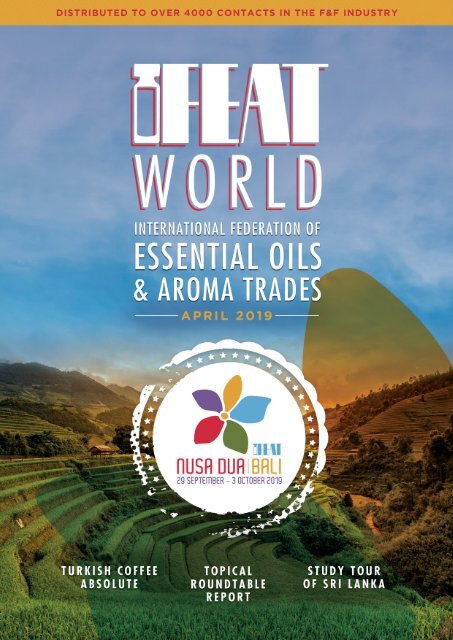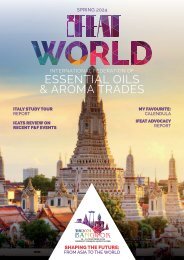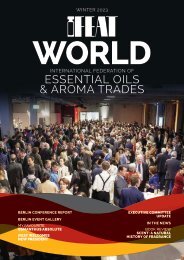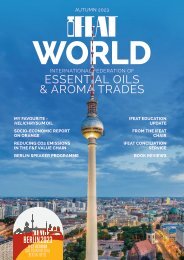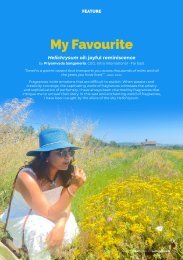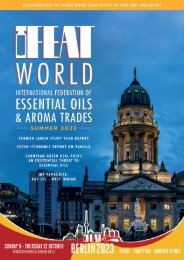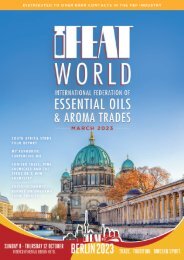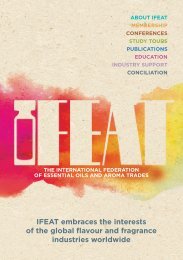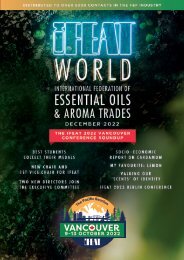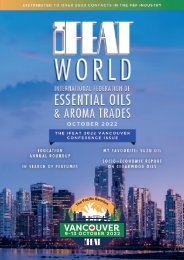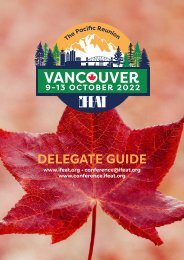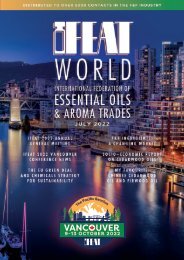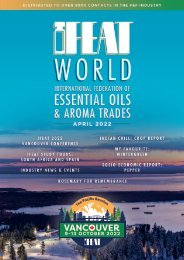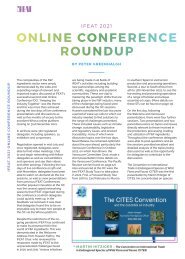Create successful ePaper yourself
Turn your PDF publications into a flip-book with our unique Google optimized e-Paper software.
WORLD 3<br />
FROM THE JOINT<br />
CONFERENCE CHAIRMEN<br />
RAVI SANGANERIA<br />
AND STEPHEN PISANO<br />
these islands. Tan Sie Yong of Chinese<br />
descent built this in 1948. Nusa Dua is<br />
predominantly luxurious and perfect for<br />
some leisurely unwinding. But if you want<br />
a piece of the action, it is 30 minutes<br />
from the happening Kuta, and 15<br />
minutes from the bustling Jimbaran.<br />
At the onset, let us extend our gratitude<br />
for the overwhelming response we<br />
received for the IFEAT Cartagena,<br />
Colombia Conference in 2018. Our<br />
annual gathering of respected colleagues<br />
from across the global fragrance, flavour,<br />
and essential oils community is one of the<br />
most anticipated destination events. It is<br />
not just the insightful learning sessions,<br />
but also the opportunity to network that<br />
brings all of us together.<br />
The beauty and culture of the location,<br />
enjoyed with colleagues and friends add<br />
that dash of extra zest to the experience.<br />
As you all know, this year Bali in<br />
Indonesia is our chosen destination. We<br />
look forward to welcoming you to IFEAT<br />
Bali <strong>2019</strong>.<br />
The Conference will be held in Nusa Dua<br />
from 29th September to 3rd October<br />
<strong>2019</strong>. A secluded world away from the<br />
teeming crowds, Nusa Dua on Bali’s<br />
southern peninsula is the capital of Bali<br />
Province. Translated from Indonesian,<br />
Nusa Dua literally means ‘Two Islands.’<br />
But the name actually refers to two small<br />
raised headlands just off the coast of<br />
the peninsula. A Hindu shrine (Pura)<br />
called Nusa Dharma stands on one of<br />
The theme for this year’s conference<br />
is “Naturals of Asia.” The focus will<br />
be on essential oils from China, India,<br />
Indonesia, Japan, Malaysia, Australia,<br />
New Zealand, Singapore, and Vietnam.<br />
Topics will include aromatic agricultural<br />
practices and challenges; organic<br />
farming, scientific developments,<br />
emerging essential oil markets,<br />
legislation, and much more. We have<br />
an interesting lineup of speakers and<br />
more confirmations are coming in. The<br />
Conference programme will consist of<br />
lectures on all four mornings. The trade<br />
exhibition will also be open all four days.<br />
In addition, there will be a number of<br />
informative workshops and discussions.<br />
More information on these will be<br />
available on the IFEAT website when<br />
details are finalised.<br />
The IFEAT Committee, the Local<br />
Organising Committee, and the Events<br />
team are working round the clock to<br />
put things in place for this exciting<br />
conference. As joint Chairmen, we look<br />
forward to welcoming you to IFEAT Bali.<br />
Terima kasih<br />
Sampai jumpa lagi (See you soon!)<br />
Ravi Sanganeria<br />
and Stephen Pisano<br />
Joint Chairmen<br />
For editorial and advertisement enquiries,<br />
please email the editor, Tina Carne, at:<br />
ifeatworld@ifeat.org
4<br />
WORLD<br />
WORLD 5<br />
BALI CONFERENCE<br />
REGISTRATION INFORMATION<br />
*PLATINUM<br />
CONFERENCE SPONSOR<br />
Member Price: $20,000<br />
NON-Member Price: N/A<br />
(Limited to 1 company)<br />
SPONSORSHIP PACKAGES<br />
*GOLD<br />
CONFERENCE SPONSOR<br />
Member Price: $14,000<br />
NON-Member Price: N/A<br />
(Limited to 3 companies)<br />
*BRONZE<br />
CONFERENCE SPONSOR<br />
Member Price: $8,000<br />
NON-Member Price: N/A<br />
(Limited to 5 companies)<br />
DELEGATE FEE RATES <strong>2019</strong><br />
*IFEAT EVENING<br />
DINNER SPONSOR<br />
EXHIBITION COCKTAIL<br />
PARTY SPONSOR<br />
*CLOSING BANQUET<br />
SPONSOR<br />
BALI CONFERENCE REGISTRATION INFORMATION<br />
Delegate Registrations Member Price Non-Member Price<br />
Early bird price to 14 MAY <strong>2019</strong> $2,100.00 $2,700.00<br />
15 MAY - 1 JULY <strong>2019</strong> $2,400.00 $3,000.00<br />
From 1 JULY <strong>2019</strong> $2,700.00 $3,300.00<br />
Day Registrations Member Price Non Member<br />
Delegate Day ticket<br />
Delegate Day ticket<br />
Per Day $700.00 $1,000.00<br />
Accompanying Person Registration AP Member Price AP Non Member Price<br />
$750.00 $1,050.00<br />
Courses Member Price Non Member Price<br />
Per Course. (Information on the courses $200.00 $275.00<br />
and workshops available will be released later).<br />
IFEAT Dinner Member Price Non Member Price<br />
Per Ticket $190.00 N/A<br />
IFEAT has a wide range of sponsorship and advertising opportunities available at the<br />
annual Conference and Exhibition. The Conference attracts an enviable international<br />
audience representing all reaches of the flavour and fragrance industry.<br />
There are packages available to suit every company’s needs and budget.<br />
All rates are in US Dollars ($).<br />
See sponsorship and advertising opportunities opposite.<br />
Member Price: $7,000<br />
NON-Member Price: N/A<br />
(Limited to 1 company)<br />
BUFFET LUNCH<br />
SPONSOR<br />
Member Price: $5,000<br />
NON-Member Price: $6,500<br />
(all 4 days) – (Limited to 2 companies)<br />
COURSE<br />
SPONSOR<br />
Member Price: $1,800<br />
NON-Member Price: $2,000<br />
(Limited to 1 company for<br />
each of the 2 courses)<br />
Member Price: $6,000<br />
NON-Member Price: $7,500<br />
(Limited to 1 company)<br />
COFFEE BREAKS<br />
SPONSOR<br />
Member Price: $3,000<br />
NON-Member Price: $4,000<br />
(all 4 days) – (Limited to 2 companies)<br />
*Available to IFEAT members only.<br />
INSERTS INTO<br />
DELEGATE PACKS<br />
(including pens, notepads)<br />
Member Price: $1,100<br />
NON-Member Price: $1,400<br />
(Limited to 8 companies)<br />
ADVERTISING IN THE<br />
CONFERENCE BROCHURE<br />
Member Price: $10,000<br />
NON-Member Price: N/A<br />
(Limited to 1 company)<br />
CONFERENCE MOBILE<br />
APP SPONSOR<br />
Member Price: $3,000<br />
NON-Member Price: $4,000<br />
(Limited to 1 company)<br />
The Conference brochure will serve as a valuable resource distributed to all delegates. This will be a simple<br />
and effective way for your organisation to reach the entire conference delegation.<br />
In addition to your advertisement, the Conference brochure will include:<br />
SPONSORSHIP AND ADVERTISING OPPORTUNITIES<br />
• Conference programme • Speaker profiles and abstracts<br />
• Exhibitor listing and sponsor information • Networking activities<br />
ADVERTISING RATES<br />
Conference Brochure Member Price Non-Member Price<br />
Centrefold Full Page (2 Ads available) $3,000 $3,600<br />
Inner Front Page (1 Ad available) $3,000 $3,600<br />
Inner Back Page (1 Ad available) $3,000 $3,600<br />
Inner Full Page (4 Ads available) $2,500 $3,000<br />
Inner Half Page (4 Ads available) $1,400 $1,700<br />
Inner Quarter Page (4 Ads available) $900 $1,000
6<br />
WORLD<br />
OBITUARIES<br />
A legacy<br />
in lime.<br />
In the 1930s, our founder<br />
Charles Pisano (2nd from right)<br />
invested in the future and<br />
OBITUARIES<br />
FRANCIS PICKTHALL<br />
Francis Pickthall, CPL Aromas’ Global <strong>Mar</strong>keting Director<br />
and one of the members of the family which founded the<br />
Group, tragically died on Friday 1st <strong>Mar</strong>ch <strong>2019</strong> after a<br />
short battle with cancer. He was 51. He leaves behind his<br />
wife, Jacqueline, and two young children, Grace and Leo.<br />
EROL MESULAM<br />
We are saddened to report that the recipient of last year’s<br />
IFEAT Founder’s Award, Erol Mesulam, Turkey’s first perfumer<br />
and board member of MG International Fragrance Company,<br />
has passed away. He is survived by his wife, two children<br />
and two grandchildren.<br />
began to produce lime oil in<br />
the Dominican Republic, and<br />
later in Cuba. Since 1993,<br />
various types of lime oil have<br />
been produced exclusively for Citrus<br />
and Allied Essences Ltd. at Productos<br />
Francis worked with so many members of the CPL divisions<br />
around the world and he will always be remembered as<br />
being open and approachable, kind and supportive of<br />
all employees. He wasn’t just seen a member of the main<br />
board, he also became a good friend to many.<br />
“Mr. Mesulam was very passionate about life, his family and<br />
his work. He was a great teacher and always enthustiastic<br />
about passing his endless knowledge regarding the fragrance<br />
industry, literature, gastronomy and many other aspects<br />
of life to everyone around him. All his family, friends and<br />
MG family will always remember him as generous and a<br />
compassionate all round person.<br />
He will be missed deeply both personally and professionally”<br />
said CEO Aslan Gülçiçek.<br />
Taniart, a Pisano family-owned business<br />
located in Tecomán, Colima, Mexico.<br />
• Oil Lime Expressed Type A<br />
• Oil Lime Expressed Type B<br />
• Oil Lime Distilled Mexican<br />
• Folded and Terpeneless Lime Oil<br />
INDUSTRY UPDATE<br />
VISIT THE NEW RIFM FRAGRANCE MATERIAL<br />
SAFETY ASSESSMENT DATA CENTRE<br />
Through 85 years and 4 generations<br />
of commitment, we have provided our<br />
customers around the globe with the<br />
highest quality materials from the earth.<br />
RIFM was formed as a nonprofit corporation in 1966. Its purpose<br />
is to assure the safe use of fragrance materials in consumer<br />
products by gathering and analysing scientific data, engaging in<br />
testing and evaluation, distributing information, cooperating with<br />
official agencies and other industry associations such as IFEAT, as<br />
well as encouraging uniform safety standards related to the use<br />
of fragrance ingredients. Indeed, it is the leading international<br />
scientific authority for the safe use of fragrance materials. All of<br />
the research conducted is reviewed by an independent Expert<br />
Panel, an international group of dermatologists, pathologists,<br />
toxicologists as well as environmental and respiratory scientists<br />
that have no commercial ties to the fragrance industry. The Expert<br />
Panel advises RIFM on its strategic approach, reviews protocols<br />
and evaluates all scientific findings. Their conclusions form<br />
the basis for the Standards set by the International Fragrance<br />
Association (IFRA).<br />
Assessments of the data supporting the safe use of fragrance<br />
materials follow the updated RIFM Criteria Document. The Criteria<br />
Document provides guidance on conducting safety assessments<br />
and is designed to incorporate the best science to appropriately<br />
evaluate fragrance ingredients using the latest testing strategies<br />
and methods. The assessments may be found by using the search<br />
feature on the website provided below and are most often<br />
also published in peer reviewed journals. Previously published<br />
assessments may equally be found through the links shown<br />
below. The information provided may, among other applications,<br />
be useful to assist with compliance, for example.<br />
RIFM Resource Centre:<br />
http://fragrancematerialsafetyresource.elsevier.com<br />
For more information on RIFM and its mission visit:<br />
www.rifm.org<br />
In case of any further questions, please contact<br />
scientific.coordinator@ifeat.org<br />
At Citrus and Allied, we are full of<br />
surprises…<br />
www.citrusandallied.com<br />
info@citrusandallied.com<br />
+1 410-273-9500
8<br />
WORLD<br />
WORLD 9<br />
MY FAVOURITE • TURKISH COFFEE ABSOLUTE • BY ASLAN GÜLÇIÇEK<br />
Coffee is part of the botanical family<br />
Rubiaceae, one of the largest families in<br />
the plant kingdom. The Rubiaceae family<br />
comprises almost 500 genera and more<br />
than 6,500 species. The coffee plant,<br />
which was discovered in Ethiopia in the<br />
11th Century, has a white blossom that<br />
smells like jasmine and a red, cherry-like<br />
fruit.<br />
The story of this aromatic brew begins<br />
in Ethiopia. Fossilised remains have<br />
been discovered next to ancient human<br />
remains in the south west of Ethiopia,<br />
the same area in which the coffee beans<br />
were first harvested from wild coffee<br />
plants. The story goes that Kaldi (or<br />
MY FAVOURITE<br />
TURKISH<br />
COFFEE ABSOLUTE<br />
BY ASLAN GÜLÇIÇEK<br />
Khalid who was a legendary Ethiopian<br />
Sufi goatherd) noticed the increased<br />
energy of his goats after they ate coffee<br />
cherries, so he ground the berries in a<br />
mortar, mixed them with animal fat, and<br />
rolled the paste into a ball for convenient<br />
portability.<br />
Some versions of the myth continue to<br />
say that Kaldi brought the coffee cherries<br />
to an Islamic monastery but the monks,<br />
disapproving of the effect, threw them on<br />
the fire. When they noticed the delicious<br />
aroma caused by this, they doused the<br />
fire, gathered the roasted coffee beans<br />
out of the ashes, ground them down and<br />
then diluted them with water, creating<br />
the world’s first cup of coffee. Coffee<br />
was given its name, not by the place of<br />
its origin (Kaffa in Ethiopia), but from<br />
the Arabic word qahwa. This reflects<br />
coffee’s spread to Yemen, where the first<br />
coffee drink was consumed by ancient<br />
practitioners of Sufism, a mystical sect<br />
of Islam. It is this Yemeni coffee that we<br />
use in Turkish coffee today.<br />
The journey continues from Yemen to<br />
Istanbul, where in 1555 two Syrian<br />
traders brought the first coffee beans<br />
to sell at busy, bustling markets. Coffee<br />
found enormous popularity with<br />
Turkish sultans in the Ottoman courts.<br />
Turkish men would also be given a<br />
cup of coffee by prospective brides, a<br />
tradition still going on today. Coffee<br />
was integral to the social and courting<br />
rituals of the day in Turkey.<br />
Many of us drink it every day,<br />
often more than once, with<br />
or without sugar, sometimes<br />
accompanied by a little sweet.<br />
We drink it when we are<br />
happy, sad, hungry, after a<br />
meal, when we meet a friend,<br />
to share a laugh or to get to know each<br />
other.<br />
Although coffee typically spread through<br />
trade and travel, coffee historians tell<br />
us that the first coffeehouse to open in<br />
Vienna was by an accident of war.<br />
In 1683, when the Turkish<br />
army fought the Austrian<br />
army, the Turks accidentally left<br />
sacks of coffee beans during<br />
a retreat from the gates of<br />
Vienna. The Austrians quickly<br />
realised the treasure they had<br />
been given and developed<br />
their own style of coffee.<br />
My dear late friend and business partner<br />
Mr. Erol Mesulam first came up with the<br />
idea of producing the essential oil of<br />
Turkish coffee around 2011. Together<br />
with our R&D team, we have searched<br />
various literature and after lots of trials<br />
with different extraction techniques,<br />
we have found our current method of<br />
obtaining Turkish Coffee Absolute which<br />
is olfactively equivalent and as delicious<br />
as a cup of Turkish coffee.<br />
We have made three different variants<br />
by using the same technique, using less,<br />
medium and well roasted Turkish coffee<br />
beans. All three variants contain high<br />
concentrations of different pyrazines<br />
and furfural derivatives. Turkish Coffee<br />
Absolute works especially very well<br />
with fragrances containing oriental<br />
and chypre notes. It also provides an<br />
all-round gourmand character to the<br />
formulations added. We introduced it to<br />
our colleagues at the World Perfumery<br />
Congress in 2018.<br />
It is my favourite essential oil to date,<br />
not only because I enjoy the strong and<br />
distinctive smell of my Turkish coffee every<br />
day, but also because of the personal<br />
touch and efforts we have put in with Erol<br />
for many years to get the best quality of<br />
the Turkish Coffee Absolute we produce<br />
and offer today.<br />
Kaldi (or Khalid who was<br />
a legendary Ethiopian Sufi<br />
goatherd) noticed the increased<br />
energy of his goats after they ate<br />
coffee cherries<br />
It is my favourite essential oil to<br />
date, not only because I enjoy<br />
the strong and distinctive smell<br />
of my Turkish coffee every day,<br />
but also because of the personal<br />
touch and efforts we have<br />
put in with Erol<br />
MY FAVOURITE • TURKISH COFFEE ABSOLUTE • BY ASLAN GÜLÇIÇEK
10<br />
WORLD<br />
WORLD 11<br />
IFEAT’S SECOND TOPICAL ROUNDTABLE • CARTAGENA 12TH SEPTEMBER 2018<br />
IFEAT’S<br />
SECOND TOPICAL<br />
ROUNDTABLE<br />
INTRODUCTION<br />
IFEAT began the Roundtable concept at<br />
the Athens Conference in 2018. At the<br />
2nd Roundtable held at the Cartagena<br />
Conference there were 55 participants<br />
from 43 organisations and 24 countries.<br />
The Roundtable aim is to facilitate debate<br />
and the exchange of information among<br />
IFEAT members around important topics<br />
common to the F&F industry.<br />
This debate was chaired by two IFEAT<br />
Executive Committee members, Dominique<br />
Roques and Hussein Fakhry, who in<br />
their introductions reiterated that IFEAT<br />
as an organisation has no point of view<br />
regarding the topics discussed and that it<br />
CARTAGENA 12TH SEPTEMBER 2018<br />
DEMAND EXCEEDING SUPPLY IN<br />
ESSENTIAL OILS: IS IT GOING TO LAST?<br />
PETER GREENHALGH GIVES <strong>IFEATWORLD</strong> A<br />
ROUNDUP OF THE ROUNDTABLE<br />
was a “pre-competitive” meeting in which<br />
no price or commercial discussions should<br />
take place.<br />
In setting the scene for the discussion it was<br />
pointed out that dramatic changes in the<br />
sector are leading to a sizeable increase<br />
in the demand for essential oils. Factors<br />
increasing demand growth included the<br />
rapid expansion of the aromatherapy<br />
sector and natural products, especially<br />
cosmetics. Meanwhile, from the supply<br />
side, farming was facing severe difficulties<br />
from global warming and other climatic<br />
factors, as well as price volatility and other<br />
economic and political factors. Recent<br />
examples of supply shortages include<br />
lavender, lavandin, eucalyptus, neroli<br />
and terpenes from natural sources.<br />
Some of the questions posed for<br />
discussion included:<br />
• Do we have a common view<br />
of the situation?<br />
• Is this just another “cycle” or a major<br />
trend (revolution?) seeing individuals<br />
seeking global and direct access to<br />
essential oils?<br />
• Does this trend justify new investment<br />
in plantations? What about “wild”<br />
(i.e. non-cultivated) crops?<br />
• Are companies in need of extra<br />
resources to invest directly at source?<br />
• General view: are essential oil<br />
producers or traders facing a threat or<br />
a great opportunity? Are we witnessing<br />
a major change in our industry or a<br />
passing craze?<br />
DEMAND AND SUPPLY<br />
OF ESSENTIAL OILS<br />
The discussion lasted just under two<br />
hours and covered a diverse range of<br />
topics and issues. There was a general<br />
recognition that both the demand and<br />
supply of essential oils was complex.<br />
From the demand side, essential oil<br />
ingredients are used in a very wide<br />
range of flavouring, fragrance and<br />
aromatherapy products. There are<br />
competing uses for many essential oils<br />
and the degree of substitutability varies<br />
from oil to oil and from use to use. From<br />
the supply side there are a large number<br />
of essential oils that are derived from a<br />
wide range of sources – roots, leaves,<br />
annual plants, trees, barks, fruit and<br />
seeds. Supply elasticities vary greatly -<br />
some are by-products (e.g. citrus oils);<br />
some can be harvested for several months<br />
each year; some are tree crops requiring<br />
long gestation periods before yielding<br />
oils. Consumers, including many of the<br />
large retail operations, are becoming<br />
increasingly knowledgeable and<br />
demanding quality products.<br />
The structure of production affects the<br />
supply of essential oils. Smallholders,<br />
often in developing countries, produce<br />
the majority of oils, often alongside<br />
other competing crops. In addition, there<br />
are more organised plantation scale<br />
production operations for some products.<br />
A key factor affecting supply is climate<br />
change, leading to greater volatility in<br />
weather patterns, e.g. droughts, floods,<br />
heat waves, frosts, unseasonal rains, all<br />
of which can create even greater supply<br />
volatility. Global warming is likely to lead<br />
to further dramatic changes in availability<br />
in the medium and longer term. Some<br />
argued that resource availability,<br />
particularly access to land and water,<br />
was diminishing while others argued<br />
that land and finance are available,<br />
particularly in Africa.<br />
The complexity of both demand and<br />
supply variables makes it difficult to<br />
generalise. Trends vary according to<br />
the product. For some oils there is a<br />
definite shortage – for others less so.<br />
Nevertheless, there was a general<br />
consensus that overall demand for<br />
natural products, including essential<br />
oils, was growing, particularly from the<br />
aromatherapy and cosmetics sectors. This<br />
was creating sizeable supply difficulties<br />
and increased prices and this demand<br />
growth was likely to continue. As one<br />
discussant pointed out, “Perhaps at last<br />
“fair prices” are beginning to be paid to<br />
producers for their products”.<br />
ORGANIC AND<br />
PESTICIDES<br />
Particular supply shortages were<br />
highlighted in the organic oils sector –<br />
although this is only a small share of the<br />
overall essential oils market. This was<br />
partly a result of increased demand and<br />
consumer awareness alongside improved<br />
testing procedures able to identify<br />
adulterants. There was a long discussion<br />
of pesticides issues and whether it was<br />
getting worse. Among the points raised<br />
were:<br />
• Measurement of adulterants is much<br />
improved; 30 or 40 years ago there<br />
were lots of pesticides used but<br />
difficult to measure. Today the quality<br />
of most oil is far better than it ever<br />
was before.<br />
• Are developed countries exporting<br />
the pesticide problem by banning<br />
them in their countries but facilitating<br />
companies exporting them to<br />
developing countries?<br />
• Some companies are working on<br />
technological solutions to avoid the<br />
use of pesticides. It is not easy to find<br />
solutions but there is a willingness to<br />
share the technology if needed.<br />
• There is very little investment in<br />
improving organic yields compared<br />
to the amount of money being used<br />
to market pesticides.<br />
• Knowledge of traditional organic<br />
farming is being lost – perhaps<br />
organisations such as IFEAT can help<br />
to spread this knowledge? Perhaps<br />
organisations such as IFEAT can<br />
look at mechanisms of accountability<br />
affecting the whole community and<br />
the globe rather than just specific<br />
products in the EU or USA.<br />
IFEAT’S SECOND TOPICAL ROUNDTABLE • CARTAGENA 12TH SEPTEMBER 2018
12<br />
WORLD<br />
JALAL CHARAF, HUSSEIN A. FAKHRY AND DOMINIQUE ROQUES<br />
• There is a need to disseminate<br />
information, particularly to new<br />
producers, about pesticides issues<br />
since they are often unaware of the<br />
concentration issues.<br />
• The view was expressed that in three<br />
to five years’ time in Europe the use<br />
of pesticides/herbicides will be<br />
banned – but there still remains the<br />
issue of pesticide residues in the soil<br />
lasting for many years.<br />
• Also, it was argued that while<br />
some growers recognised the need<br />
to minimise pesticide/herbicide use,<br />
they are vital to ensuring the supply<br />
of some oils.<br />
FUTURE ESSENTIAL<br />
OIL SUPPLIES AND<br />
INVESTMENT<br />
A majority of those present felt that<br />
growth in demand and continued supply<br />
shortages was a lasting trend rather than<br />
one of the typical cycles in the industry.<br />
Nevertheless, individual product cycles<br />
would continue, and some oil prices<br />
would come down because of shortterm<br />
over-expansion of production, e.g.<br />
helichrysum. However, it was argued that<br />
many producers are reluctant to invest<br />
unless they can obtain commitments from<br />
companies to purchase using medium or<br />
longer-term contracts. But major traders<br />
and retailers will not lock into long-term<br />
prices – and at present will not permit<br />
price increases even if raw material<br />
prices rise.<br />
While hard and fixed contracts are<br />
unlikely to work in farming, some<br />
larger companies, especially those in<br />
the aromatherapy sector, appear to be<br />
developing new business models with<br />
flexible and longer-term contracts with<br />
essential oil suppliers. A number of<br />
instruments and support mechanisms are<br />
being utilised to encourage and facilitate<br />
production, such as pre-payments, cooperatives,<br />
provision of correct planting<br />
materials and agronomic advice.<br />
Moreover, producers are currently in a<br />
better position to obtain greater longerterm<br />
commitments from their buyers.<br />
It was reported that private equity<br />
operations have analysed the market<br />
and are willing to invest in production.<br />
But it is not easy convincing farmers to<br />
go into the essential oils business. Land<br />
might be available, but farmers need<br />
education and other types of support.<br />
In addition, there is a need to invest in<br />
new ways of production and extraction,<br />
with reduced energy inputs.<br />
The current situation should be viewed<br />
as an opportunity rather than a<br />
challenge. Honesty and transparency<br />
should be the key words in any<br />
business relationship. In the past, the<br />
F&F industry has been known for its<br />
secretiveness but there should be a<br />
greater willingness to share information<br />
and knowledge if we are to overcome<br />
the current difficulties. The IFEAT<br />
app developed for the Cartagena<br />
Conference was praised as a means<br />
of sharing information and promoting<br />
companies and products – and would<br />
facilitate the entry of new companies<br />
into the business. It was also suggested<br />
that IFEAT should gather information<br />
about every essential oil to facilitate<br />
investment, but it was recognised that<br />
this would take a lot of resources and<br />
effort if full transparency was to be<br />
achieved. Moreover, can a database<br />
be possible given the recent EU GDPR<br />
(General Data Protection Regulation)?
14 WORLD<br />
WORLD 15<br />
IFEAT STUDY TOUR <strong>2019</strong> • SRI LANKA<br />
12th ANNUAL IFEAT STUDY TOUR <strong>2019</strong><br />
IFEAT’s 12th Study Tour to Sri Lanka<br />
(SLST) is already fully booked and will<br />
take place from 22nd to 31st July <strong>2019</strong>.<br />
IFEAT’s first study tour was also to Sri<br />
Lanka in late April 2005 – and it is<br />
interesting to compare these tours and<br />
some of the changes that have taken<br />
place since then. On the 2005 tour there<br />
were 11 delegates from seven countries,<br />
including Stephen Pisano, Chair of the<br />
IFEAT Study Tour Committee, who will be<br />
one of the delegates on the <strong>2019</strong> tour.<br />
While IFEAT study tours are now restricted<br />
to IFEAT member companies and limited<br />
to one participant per company, some<br />
50 delegates from 25 countries have<br />
registered for the SLST, illustrating the<br />
multinational nature of the IFEAT family.<br />
The routes of the two tours are similar<br />
but the length of the 2005 study tour<br />
was seven days compared with ten days<br />
on the <strong>2019</strong> tour. The 2005 tour was<br />
organised by Dr Clinton Green alongside<br />
the Local Organising Committee (LOC)<br />
who faced various problems, following the<br />
devastating tsunami of December 2004,<br />
which did much damage to the local<br />
infrastructure. Some members of the 2005<br />
LOC are closely involved in organising the<br />
<strong>2019</strong> tour including Dr Nugawela of Link<br />
SRI LANKA<br />
Natural, Chair of the LOC, Mr D.A. Perera<br />
of EOAS Organics, who has participated<br />
in many previous IFEAT tours, Mr Fazal<br />
Mushin, who played a key role in the 2005<br />
tour, Mr H.D de Silva of the HDDES Group<br />
and Mr. Karunarathna of L.B. Spices, all<br />
longstanding Sri Lankan members of IFEAT.<br />
Walkers Tours, who were the DMC for<br />
IFEAT’s 2015 Colombo Conference, will be<br />
the travel partner.<br />
Sri Lanka or the “Spice Island” has diverse<br />
climatic zones facilitating the production<br />
of many aromatic and medicinal plants.<br />
Spices and essential oils is an important<br />
sector and after tea, the sector generates<br />
the largest agricultural foreign exchange<br />
earnings: in excess of 90,000 hectares<br />
(ha) of the wet zone is under spices.<br />
Cinnamon (Cinnamomum zeylanicum and<br />
Cinnamomum verum), along with pepper,<br />
is the dominant spice crop and the only<br />
spice grown in Sri Lanka as a mono-crop<br />
in the southwest region. Growers range<br />
from smallholders with 1 ha or less to<br />
plantations up to 200 ha. Smallholders<br />
own most of the cinnamon cultivated<br />
lands, with an estimated 80% grown on<br />
lands below 1 ha. An estimated 250,000<br />
cinnamon cultivators, 400,000 cinnamon<br />
sector employees and 60,000 family units<br />
are directly dependent on the cinnamon<br />
industry as their main income source (C.<br />
Perera IFEAT Conference 2015). As the<br />
table illustrates, cinnamon in the form<br />
of both a spice and essential oil is the<br />
dominant export.<br />
The itinerary includes visits to see the<br />
production and processing of a range<br />
of F&F products including cinnamon<br />
and citronella in the southern coastal<br />
belt; black pepper, cloves, nutmeg and<br />
sandalwood in the central hills as well as<br />
spice farms and oleoresin, ayurvedic/<br />
herbal production and R&D operations.<br />
The map provides a summary of the<br />
places to be visited and some of the<br />
products to be seen. The tour starts in<br />
Colombo – the capital city – with a<br />
welcome reception and tour briefing.<br />
The next two days will be spent in the<br />
south looking at all aspects of cinnamon<br />
growing and processing alongside<br />
some other products. Then a visit to the<br />
citronella production areas before driving<br />
up to the Central Highlands, where a<br />
range of essential oils and spices is grown<br />
and processed – nutmeg, cloves, black<br />
pepper and sandalwood. Some other<br />
spices and oils are produced here and<br />
there may be an opportunity to visit these<br />
and one of the spice farms. The Export<br />
Development Board is sponsoring a<br />
workshop in Dambulla, where delegates<br />
will hear presentations by the EDB, as<br />
well as have the opportunity to meet<br />
up with all IFEAT’s Sri Lankan member<br />
companies and representatives of the<br />
Spice Council and SAPPTA.<br />
Over a decade ago, Sri Lanka started<br />
oleoresin production for export, initially<br />
for western markets where food industry<br />
processing was centred. The major<br />
oleoresin product was pepper, partly<br />
because of Sri Lankan pepper’s high<br />
piperine level. However, for economic<br />
and technical reasons, Sri Lanka is at a<br />
considerable competitive disadvantage<br />
to neighbouring India. Nevertheless, Sri<br />
Lanka is trying to create a competitive<br />
advantage by developing production of<br />
more specialist oleoresin products – but<br />
this is a relatively small niche sector.<br />
In addition, an estimated 1,500 medicinal<br />
plants are used in Sri Lanka, mainly in<br />
traditional ayurvedic medicine. But major<br />
new markets are being developed by Sri<br />
Lankan companies in the food, beverage,<br />
supplement and cosmetic markets using<br />
the synergies between essential oils,<br />
spices and medicinal plants.<br />
Besides seeing the wide range of<br />
aromatic and medicinal materials<br />
available – the journey will enable<br />
delegates to see the physical beauty of<br />
Sri Lanka and its rich culture reflecting<br />
a history stretching back thousands of<br />
years. The detailed brochure, including<br />
itinerary, is available on the IFEAT<br />
website www.ifeat.org<br />
ESSENTIAL OIL & SPICE EXPORTS<br />
VOLUME IN MT<br />
Product<br />
Citronella<br />
Cinnamon leaf oil<br />
Cinnamon bark oil<br />
Clove bud oil<br />
Nutmeg oil<br />
Black pepper oil<br />
SPICES<br />
Cinnamon<br />
Clove<br />
Nutmeg & mace<br />
Black pepper<br />
2015<br />
7.84<br />
264.65<br />
14.42<br />
9.88<br />
67.98<br />
61.38<br />
13,548.81<br />
5,518.75<br />
1,889.04<br />
16,656.65<br />
Source: Export Development Board<br />
2016<br />
8.26<br />
226.40<br />
27.32<br />
6.23<br />
122.35<br />
42.73<br />
14,692.77<br />
1,842.68<br />
1,705.04<br />
7,875.58<br />
2017<br />
38.03<br />
309.01<br />
40.52<br />
9.41<br />
65.47<br />
48.98<br />
16,617.09<br />
7,805.60<br />
2,042.87<br />
13,309.19<br />
2018<br />
40.87<br />
280.88<br />
42.79<br />
10.65<br />
51.52<br />
66.52<br />
17,536.57<br />
3,279.58<br />
1,938.37<br />
13,118.14<br />
IFEAT STUDY TOUR <strong>2019</strong> • SRI LANKA
NEW IFEAT MEMBERS<br />
Below is a list of new IFEAT members who had joined by 1st <strong>Mar</strong>ch <strong>2019</strong><br />
Arpan Aromatics<br />
14, Maskati <strong>Mar</strong>ket, Kalupu, Ahmedabad - 380002<br />
India<br />
Contact: Mr Arpan Shah<br />
Email: arpanaromatics@yahoo.co.in<br />
Web: http://arpanaromatics.com<br />
Bengbu Tonyoung Imp. & Exp. Co., Ltd.<br />
No.20, 28 Building Huahai <strong>Mar</strong>ket, Bengbu, Anhui 233000<br />
China<br />
Contact: Mr Jason He<br />
Email: jason@ahspiceoils.com<br />
Web: http://ahspiceoils.com/index.asp<br />
Live Natural d.o.o.<br />
ul. Vizantijski Bulevar bb, 18 000 Nis<br />
Serbia<br />
Contact: Ms Ljiljana Petrovic<br />
Email: livenatural.plantaze@gmail.com<br />
Web: Under construction<br />
Laboratoire PhytoChemia<br />
628 Boulevard du Saguenay Quest,<br />
Saguenay (Chicoutimi), Quebec, G7J 1H4<br />
Canada<br />
Contact: Mr Hubert <strong>Mar</strong>ceau<br />
Email: h.marceau@phytochemia.com<br />
Web: www.phytochemia.com/en/home<br />
PRIMAVERA LIFE GmbH<br />
Naturparadies 1, 87466 Oy-Mittelberg<br />
Germany<br />
Contact: Ms Ioanna Mantzouki<br />
Email: Ioanna.Mantzouki@primaveralife.com<br />
Web: www.primaveralife.com/en<br />
Essential Oils & Herbs Ltd.<br />
26 “Antim I” Str., Burgas 8000<br />
Bulgaria<br />
Contact: Mr Dimitar Petkov<br />
Email: office@essentialoilsandherbs.eu<br />
Web: www.essentialoilsandherbs.eu<br />
S. Kushalchand International Pvt. Ltd.<br />
16th Floor, “G” Wing, 1601, Lotus Corporate Park,<br />
Graham Firth Steel Compound, Next to Jai Coach Signal,<br />
Opp. Western Express Highway, Goregaon (East),<br />
Mumbai - 400 063<br />
India<br />
Contact: Mr. Prasad Pawar<br />
Email: prasadpawar@skushalchand.com<br />
Web: Under construction<br />
PT Mignon Sista International<br />
JL. RAYA GBHN No. 120, DESA BOJONGNANGKA,<br />
KEC. GN PUTRI, KAB. BOGOR 16963<br />
Indonesia<br />
Contact: Ms Liana Hardiyanto<br />
Email: liana@mignon-international.com<br />
Web: www.mignon-international.com<br />
Ayuroma Centre<br />
116/317, Adarsh nagar, Rawatpur gaon, Kanpur nagar (U.P)<br />
India<br />
Contact: Mr Anurag Katiyar<br />
Email: info.ayuroma@gmail.com<br />
Web: http://ayuromacentre.com<br />
NS Mint Products Pvt. Ltd.<br />
Near 2km stone Moradabad road, Sambhal - 244302 (U.P.)<br />
India<br />
Contact: Mr Ashutosh Rastogi<br />
Email: sales@nsmint.com<br />
Web: http://nsmint.com<br />
Oswal Chemicals<br />
C-105, GCP Business Centre, Opp.Memnagar Fire Station,<br />
Navrangpura, Ahmedabad - 380 009, Gurajat<br />
India<br />
Contact: Mr Vrajesh Shah<br />
Email: exports@oswalchemical.com<br />
Web: Under construction<br />
La Drôme Provencale<br />
270 chemin de la tuiliere, 26340 Saillans<br />
France<br />
Contact: Ms Corinne Cazeneuve<br />
Email: corinne.cazeneuve@ladrome.bio<br />
Web: www.ladrome.bio<br />
JACARANDAS Sarl<br />
Pres 19, Cites Gallois, Andrefan’Ambohijanahary 101,<br />
Antananarivo<br />
Madagascar<br />
Contact: Ms Lisa Generali<br />
Email: lisa.generali@moov.mg<br />
Web: https://jacarandas-international.com/en<br />
Link U (Zhuhai) Science & Technology Ltd.<br />
#2206 Henquin Headquarter Building, Zhuhai, Guangdong<br />
China<br />
Contact: Mr <strong>Mar</strong>k Lin<br />
Email: mark@cnlink-u.com<br />
Web: Under construction<br />
CENIVAM<br />
Building 45, CENIVAM, UIS, Carrera 27, Calle 9,<br />
Bucaramanga 680002<br />
Colombia<br />
Contact: Prof. Dr. Elena Stashenko<br />
Email: elena@tucan.uis.edu.co<br />
Web: http://cenivam.uis.edu.co/cenivam<br />
Perfect Herbals & Oils<br />
Ashoka Heights, H-104, Near Mowa over Bridge, Mowa,<br />
Raipur, Chhatisgarh 492007<br />
India<br />
Contact: Ms Bhoomika Upadhyana<br />
Email: bhoomika@phoils.com<br />
Web: http://phoils.com<br />
Mentha & Allied Products Private Ltd.<br />
309-311, 3rd Floor, Pragati Tower, 26 Rajendra Place,<br />
New Delhi - 110008<br />
India<br />
Contact: Mr Harshvardhan Nanda<br />
Email: harshvardhan_nanda@menthaallied.com<br />
Web: http://www.menthaallied.com<br />
Indo-GSP Chemical LLP<br />
Office no.6, Lalita Complex, Opp. HDFC Bank Mitakhali,<br />
Ahmedabad 380009, Gurajat<br />
India<br />
Contact: Mr Ashish Bhuva<br />
Email: ashish@indogsp.com<br />
Web: http://indogsp.com<br />
THE INTERNATIONAL FEDERATION OF ESSENTIAL OILS AND AROMA TRADES LIMITED<br />
6th Floor, Mutual House, 70 Conduit Street, London W1S 2GF<br />
T: +44 (0) 1707 245862 | E: secretariat@ifeat.org | www.ifeat.org | www.facebook.com/IFEAT.ORG | Editorial & Advertising enquiries: Tina Carne. E: ifeatworld@ifeat.org<br />
Registered in England & Wales with liability limited by guarantee under Company no. 01369368<br />
© IFEAT. All rights reserved. No part of this publication may be copied, stored, published or in any way reproduced without the prior written consent of IFEAT.<br />
A Fitzpatrick Design


